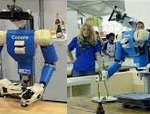Artificial intelligence (AI) has hit the headlines again this month. Robot technology continues to make advances, though there is still some way before we confuse robots with humans judging by Rory Cellan-Jones conversation with Rose the chatbot earlier this week. But progress been steady and it is likely that that in due course many jobs will have been taken over by digital brains. The University of Oxford and financial firm Deloitte have published research suggesting that over a third of current jobs could be lost to automation. Low-skilled and low-paid workers are expected to be hit the hardest.

This may be bad news for a future government’s employment figures, but some employers may be looking forward to the idea of having fewer people to manage. Machines don’t have protected characteristics and they don’t accrue unfair dismissal rights after two years – not yet anyway.
That said, Deloitte’s research has predicted that whilst technical jobs are falling, other jobs in teaching, care work, project management and general business planning have multiplied at a much faster rate. Computers can rarely interpret the law. Britain’s increasingly ageing population makes care workers all the more relevant, and even if automation is practical in some areas people just won’t want it.
Ian Brinkley, Senior Economic Advisor at Lancaster University, has also made the point that some of these jobs tend to be quite low paid. Technological advances are expensive by comparison and are likely to remain so for the foreseeable future, so it may not make business sense to automate either.
So Britain’s supposed shortage of low/medium grade technical workers may not be an issue for as long as predicted, but the need for well-educated engineers and business professionals is likely to increase. Education and care workers will also go up in demand. That means it will be more important than ever for employers to work with colleges and universities to develop high performing professionals and to create apprenticeships to get the skilled workforce they need.
Looking into the more foreseeable future, as AI starts to enter the workplace employees will need to adapt to use and interface with it. Some will embrace this, some will find it difficult, and others will resist it. People will need support in adapting, and employers should be patient at first. Not everyone has grown up with this kind of technology and finds it easy. It is not fair (particularly if an employee has 103 weeks’ service) to dismiss the moment someone has a problem with a new system.
If, after a reasonable period of training and support, certain employees cannot adapt to the new technology then the capability process must be invoked. If all attempts to deal with the problem fail, and the employee cannot be redeployed to another appropriate vacancy, the employer would have to consider dismissal. For some it may be easier to have a protected conversation about a settlement agreement early on in the process to save time and, in the long-run, money.
It’s fashionable for researchers to predict huge changes, and it gets them nice headlines. Some may well come true, but it is likely most companies will bring AI into the workplace at a gradual rate. The organisations that introduce it more quickly will be the ones that focus on software, and most employees are more likely to get on with the new systems anyway. Some will suffer, but if new roles are created then trusted lower-grade technicians may be offered retraining by the Company if their current jobs are being superseded by AI.
Nobody knows what the future will hold. Just expect surprises. In 1943 Thomas Watson, then Chairman of IBM (no less) said: "I think there is a world market for maybe five computers." With hindsight that’s a staggering prediction. Realistically it is likely to be some while before many jobs are taken over by AI. That gives us time to monitor progress, think, plan and prepare to adapt.
Russell HR Consulting provides expert knowledge in HR solutions, employment law training and HR tools and resources to businesses across the UK.
Subscribe to our free monthly HR newsletter. Russell HR Consulting employment law newsletters are emailed automatically to our ever-growing number of subscribers every month.
Latest blog posts
- Is There a Santa Clause?
06 / 12 / 2023
- Lend Us a Hand!
22 / 11 / 2023
- What Happens When There is a Clash in Protected Characteristics?
17 / 10 / 2023
- Encouraging a Healthy Workforce 2
21 / 09 / 2023
- Encouraging a Healthy Workforce
23 / 08 / 2023
- What a Disaster - (But We Have a Cunning Plan!)
20 / 07 / 2023
- It’s Time We Stiffened the Sinews
14 / 06 / 2023
- Why Is It So Important to Develop Emotional Resilience?
16 / 05 / 2023
- When is a discretionary bonus not discretionary?
20 / 04 / 2023
- Recovering Training Costs 15 / 03 / 2023
